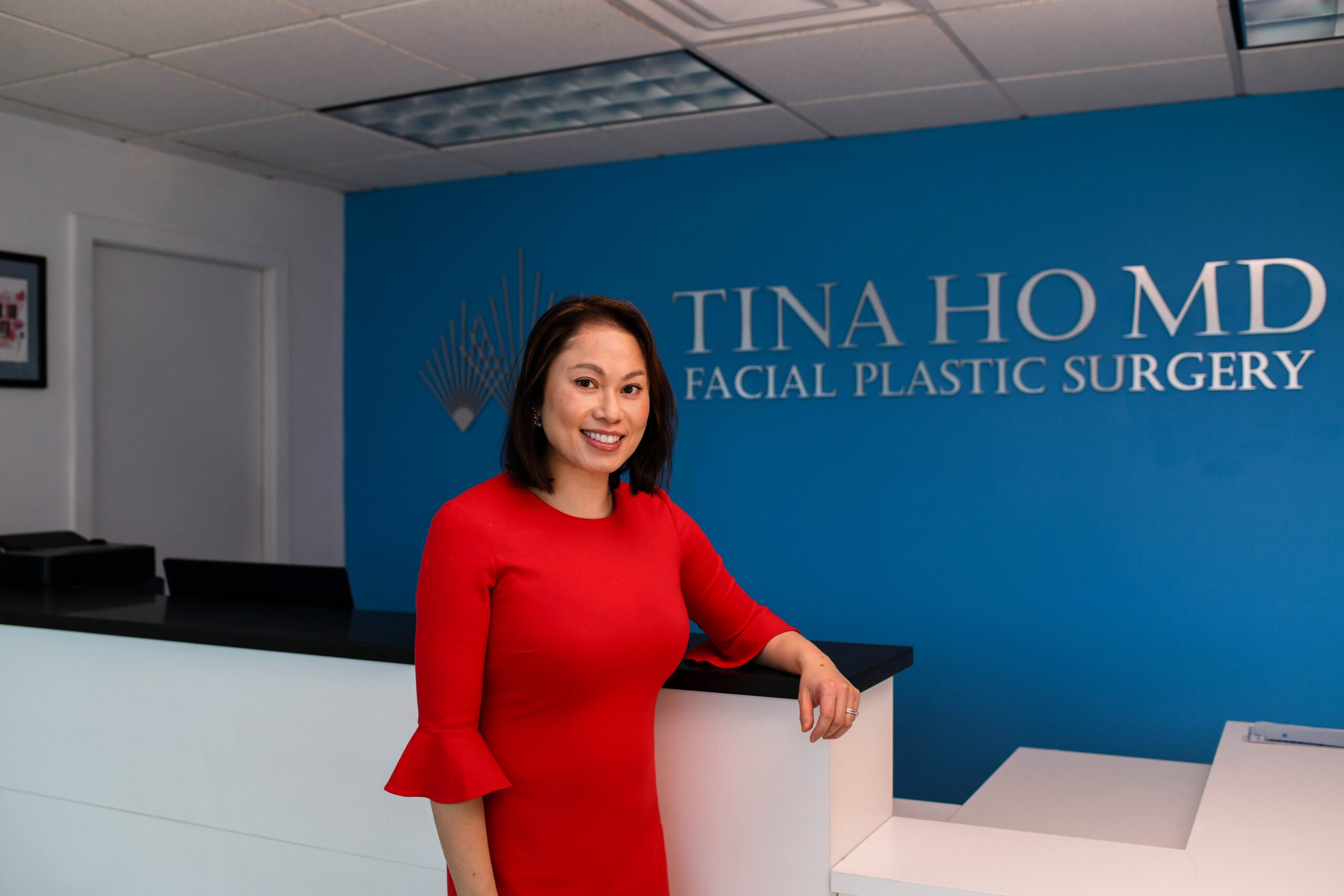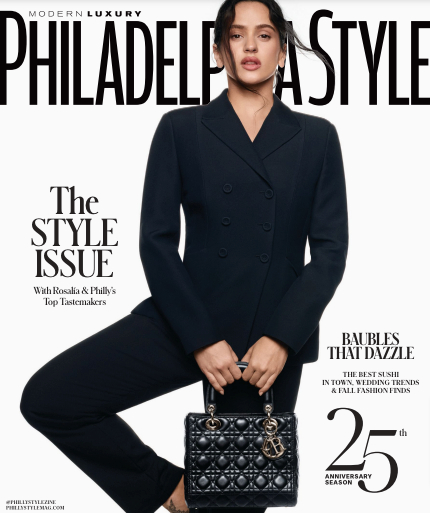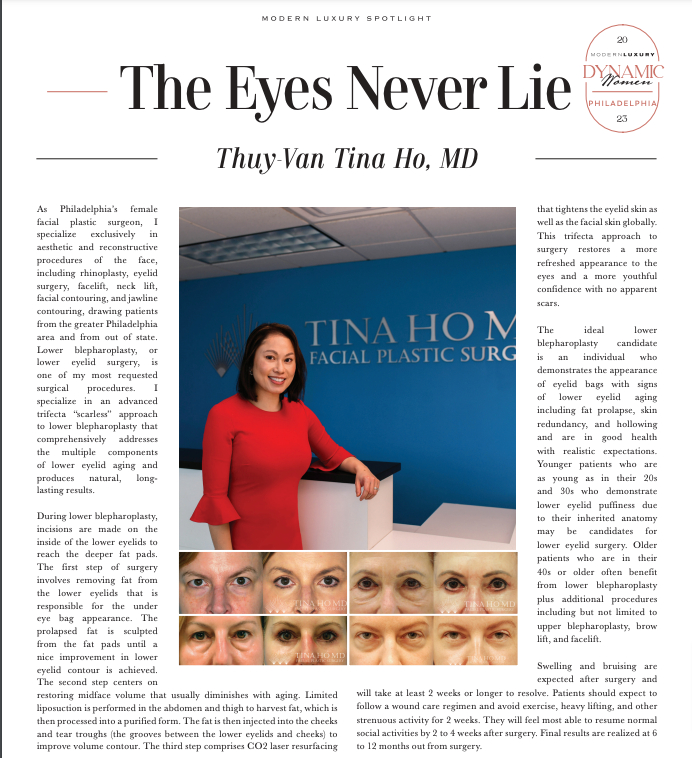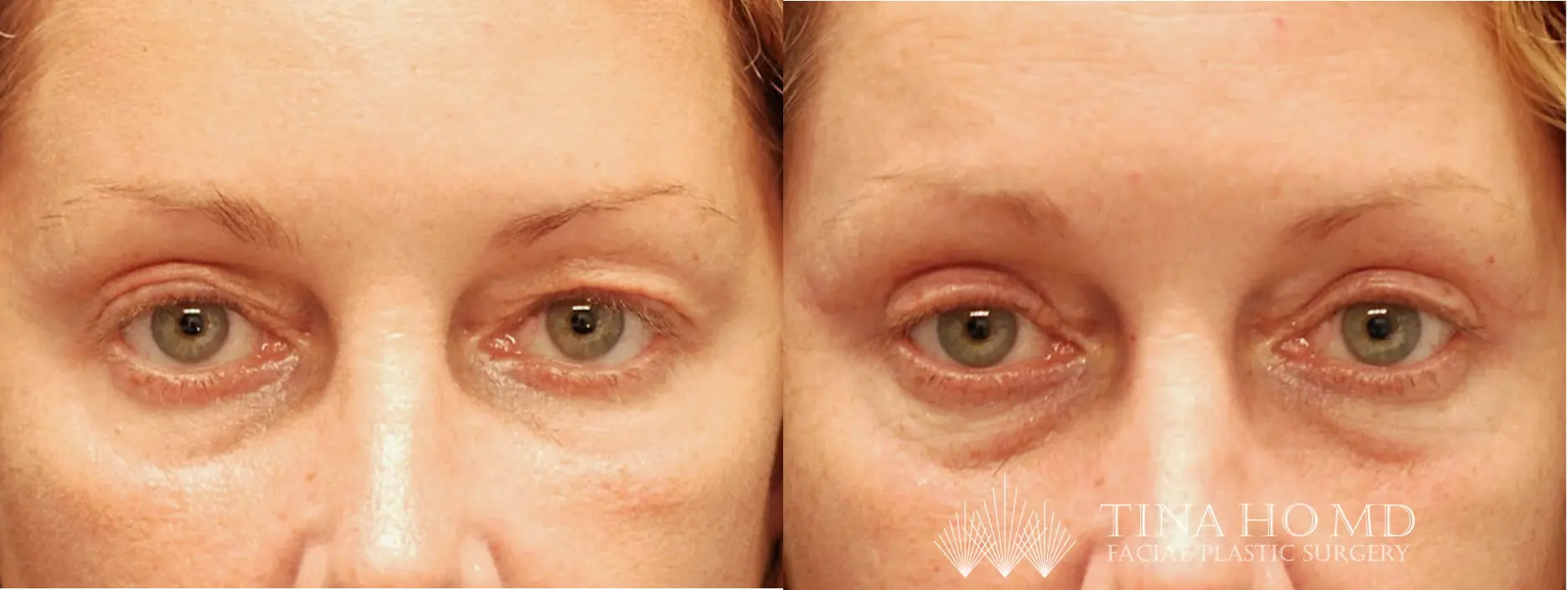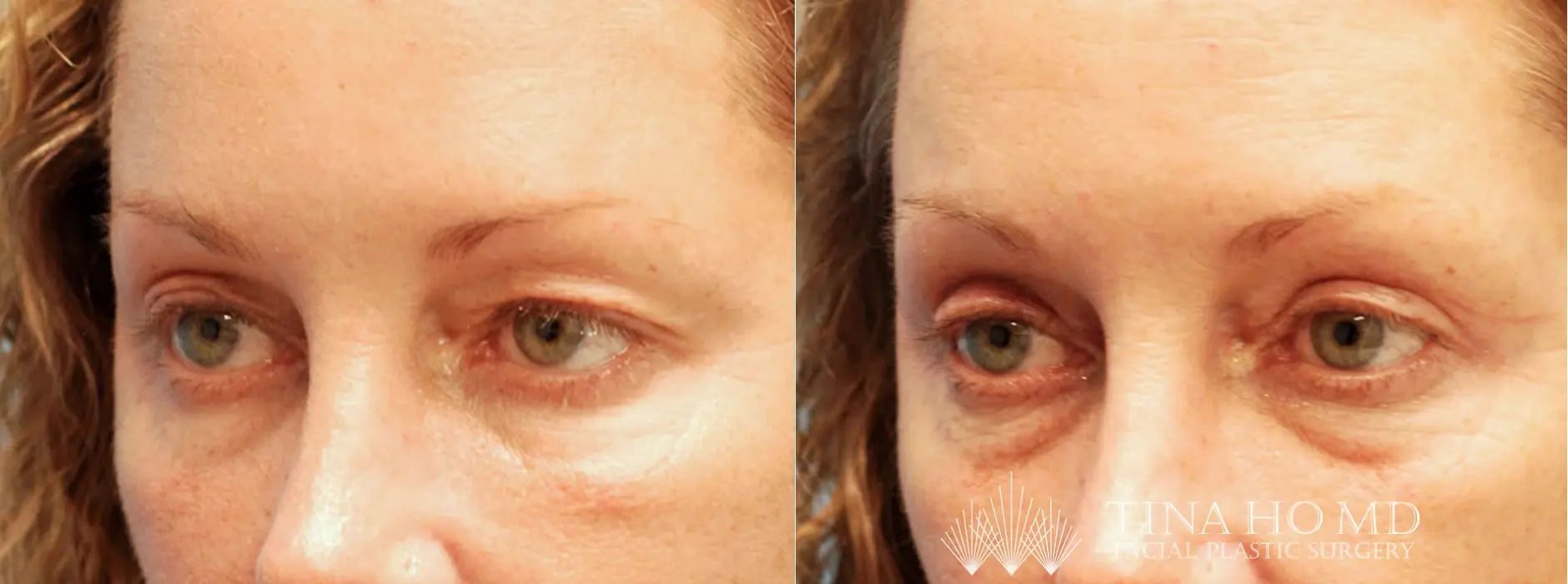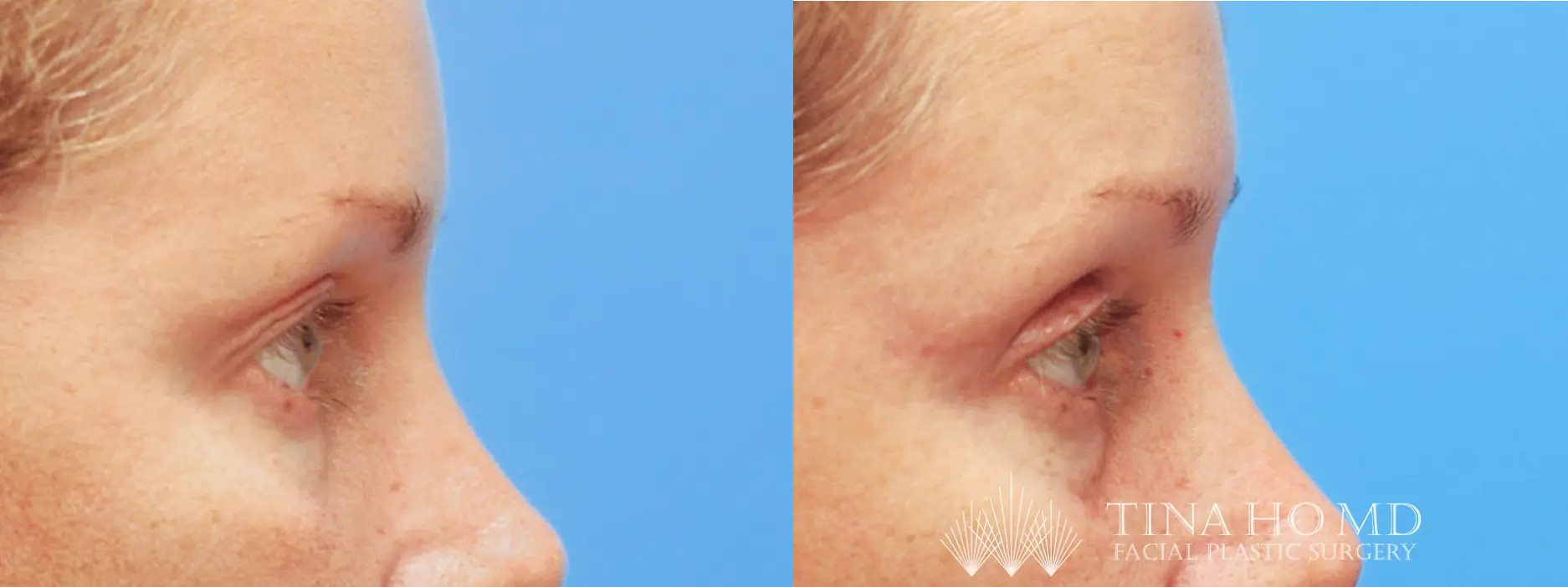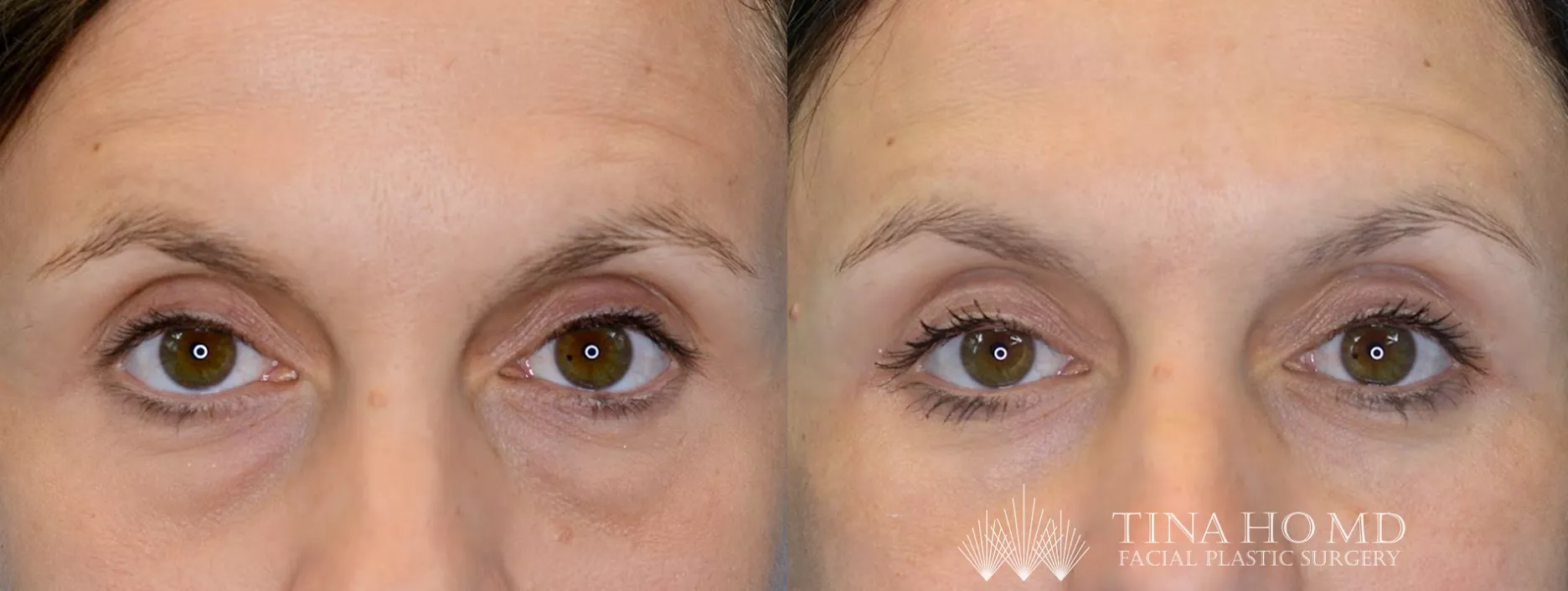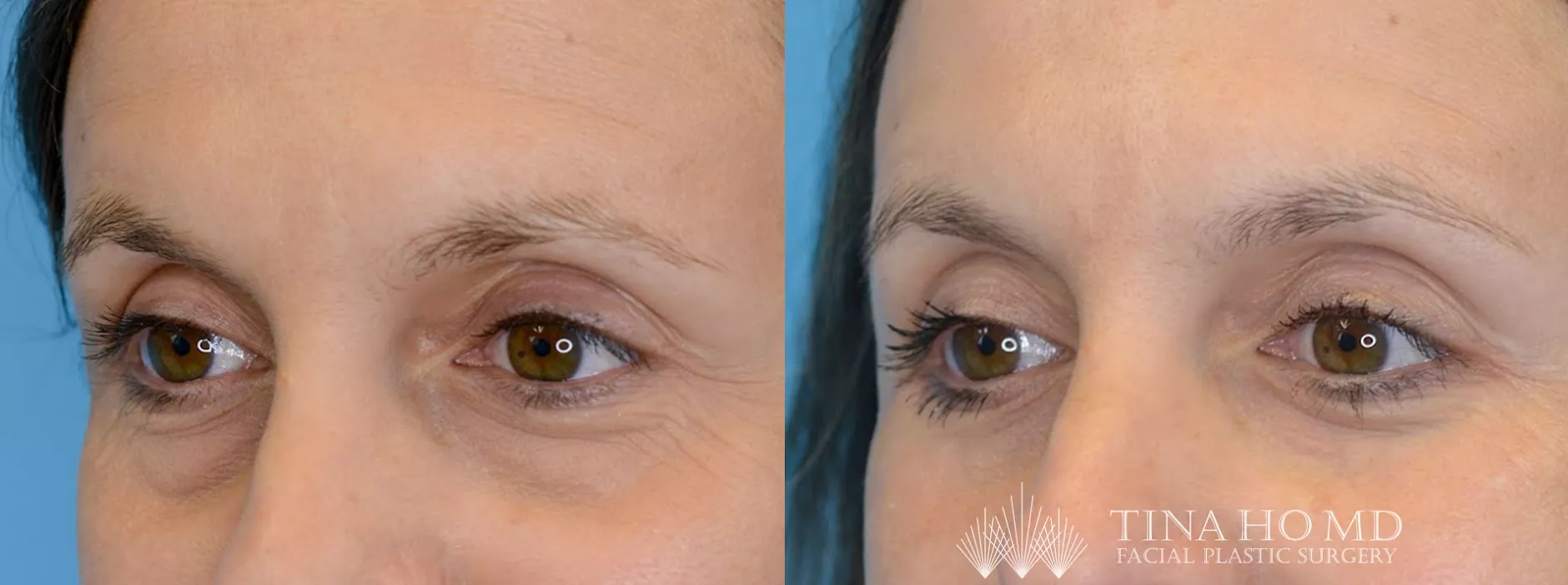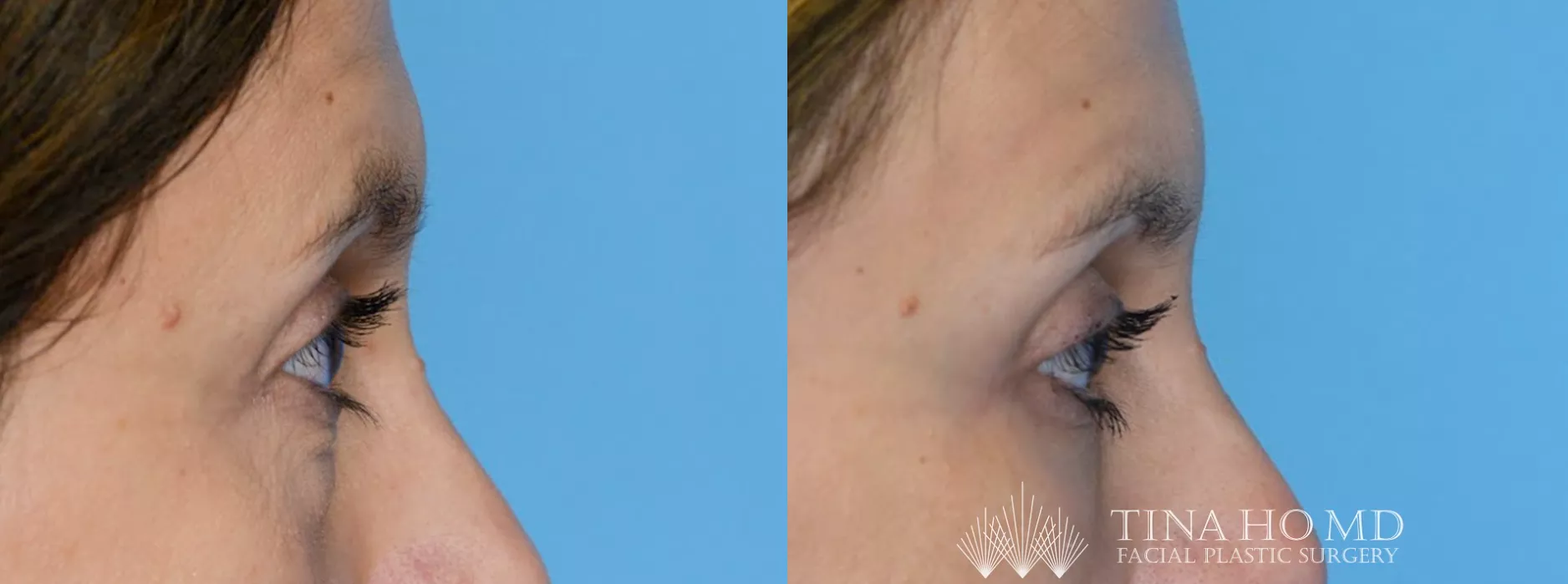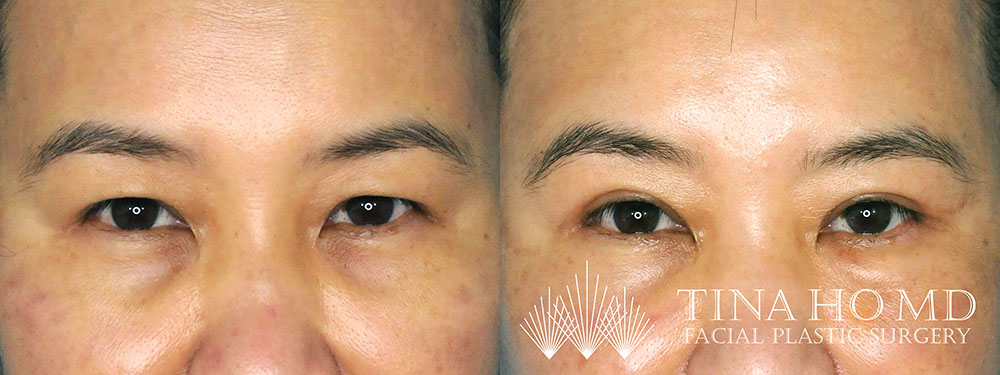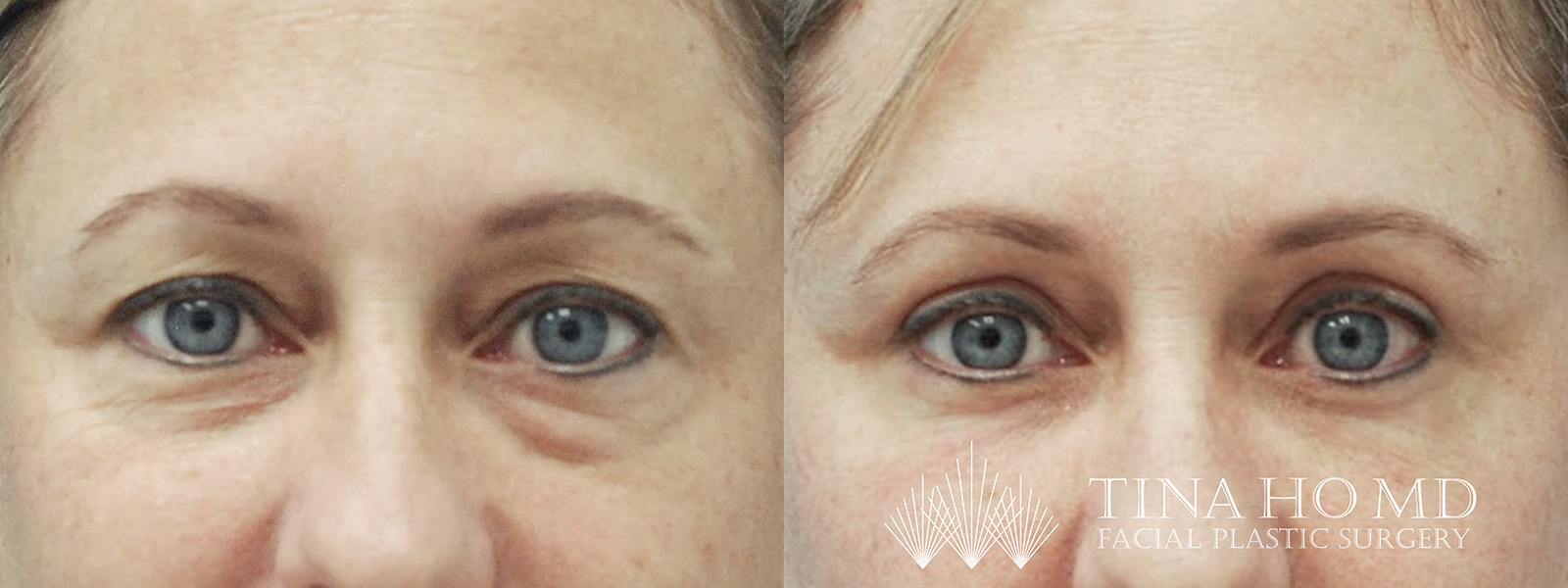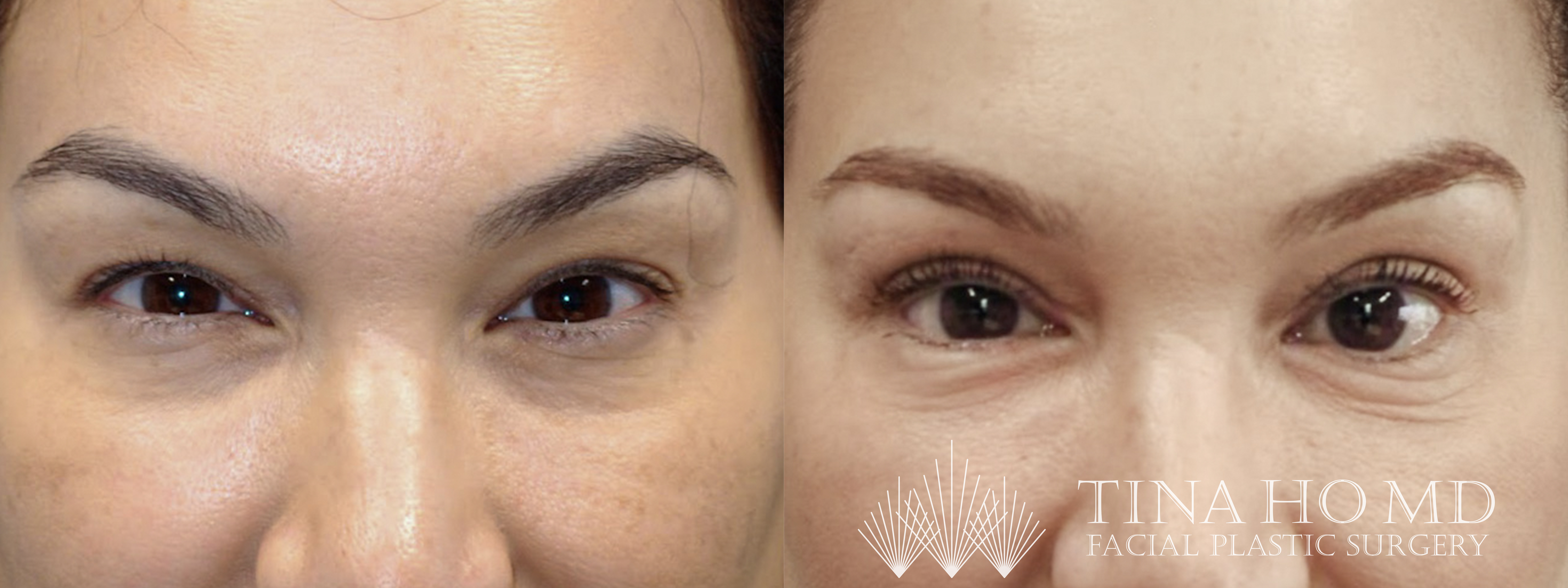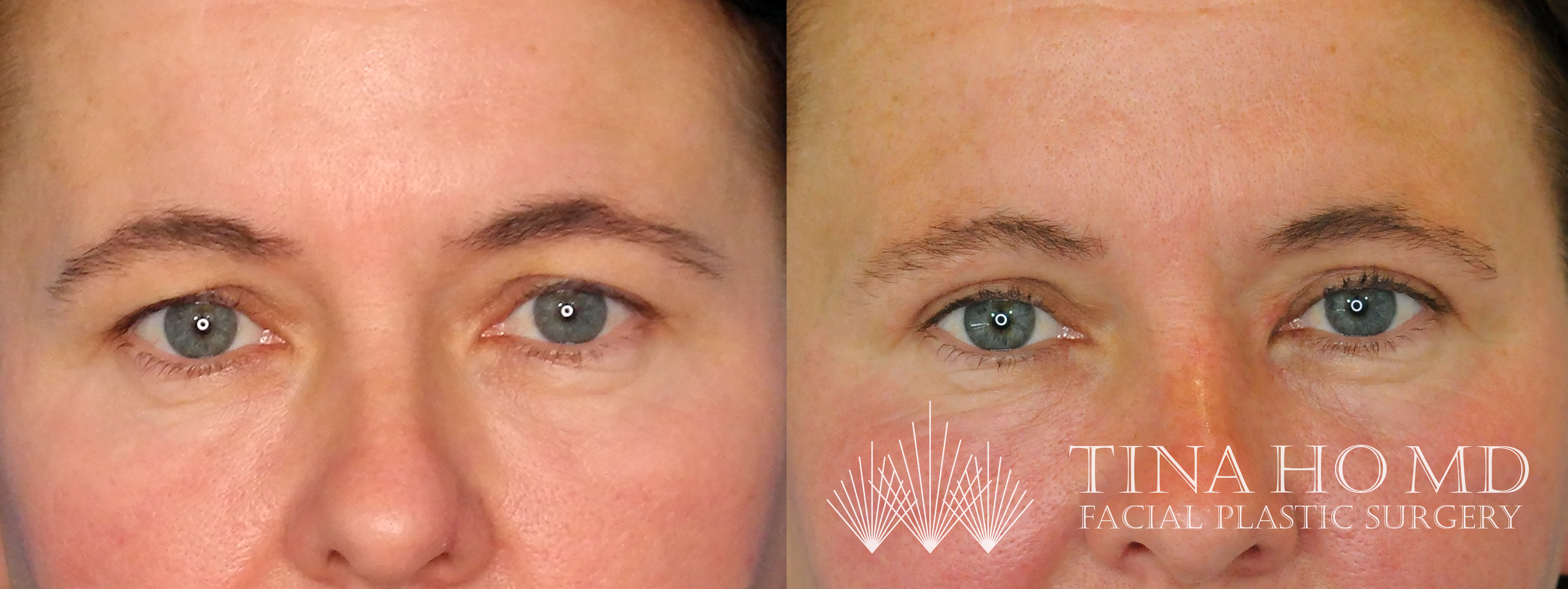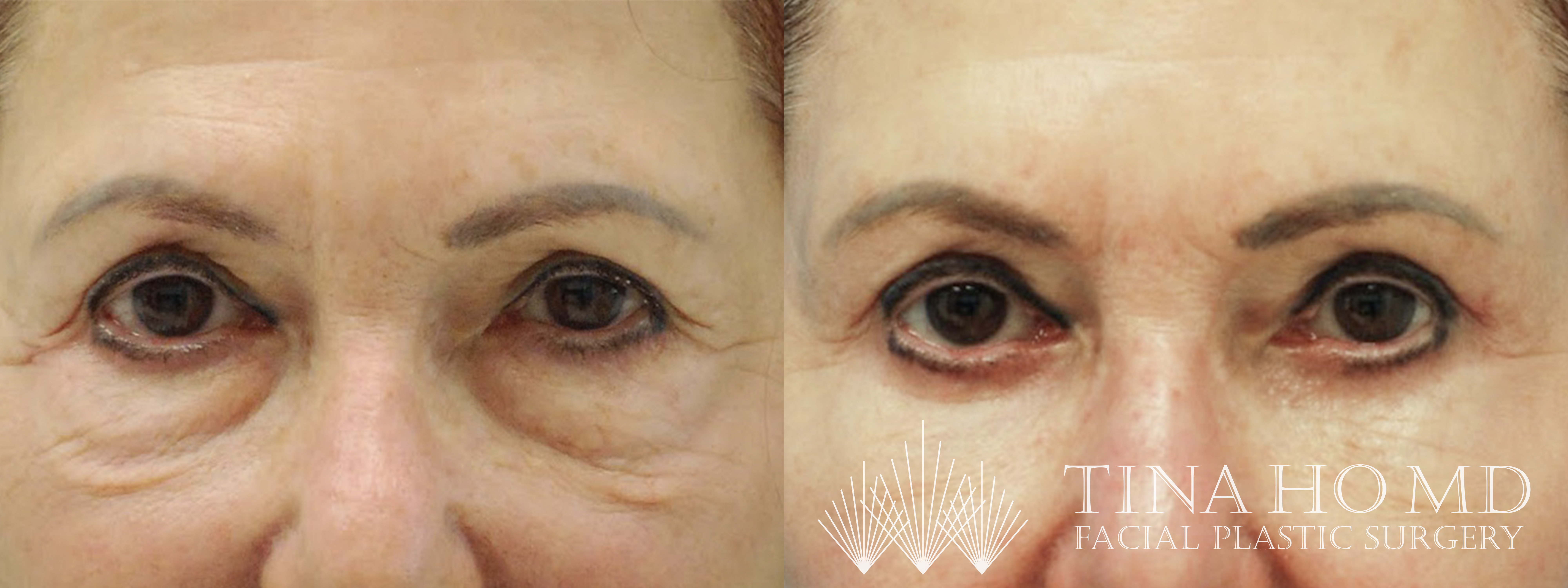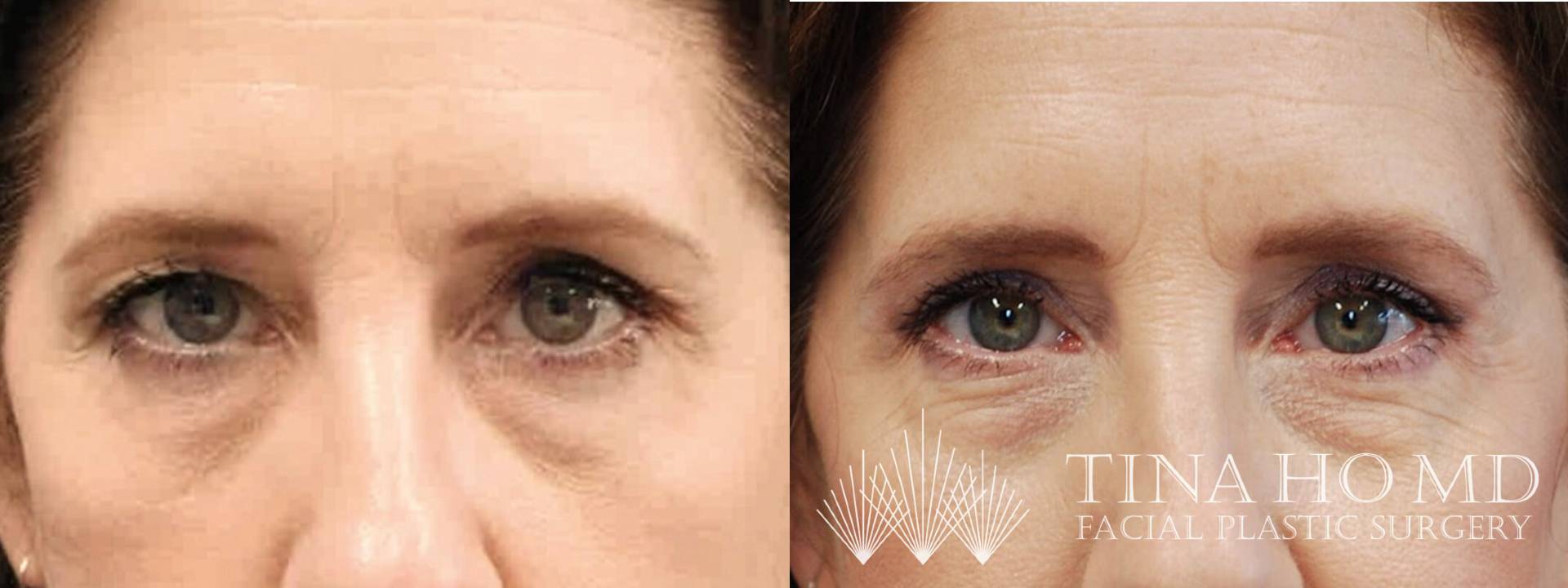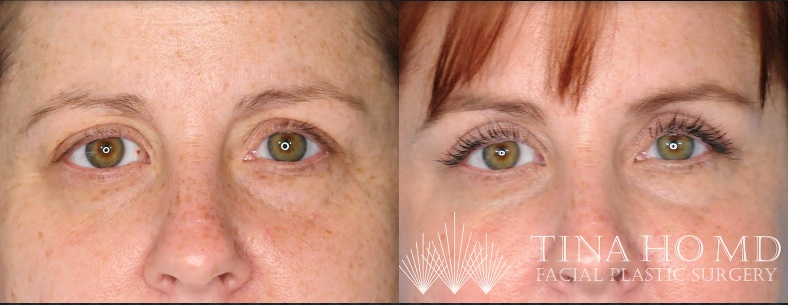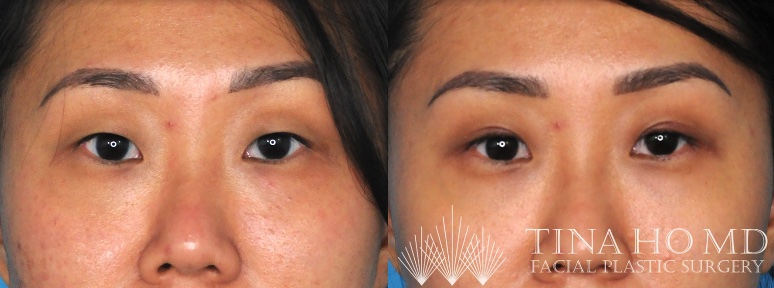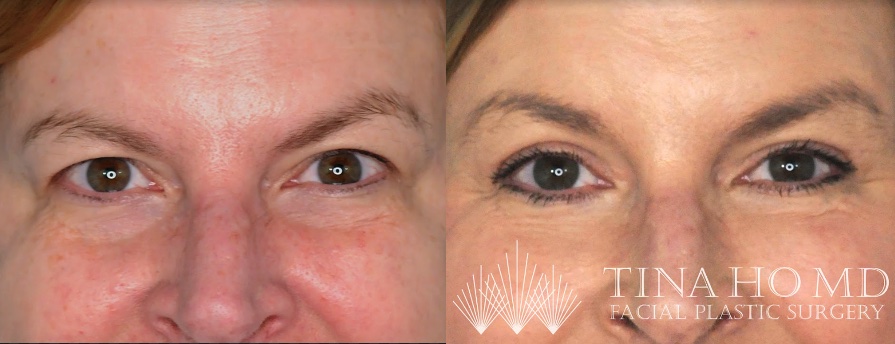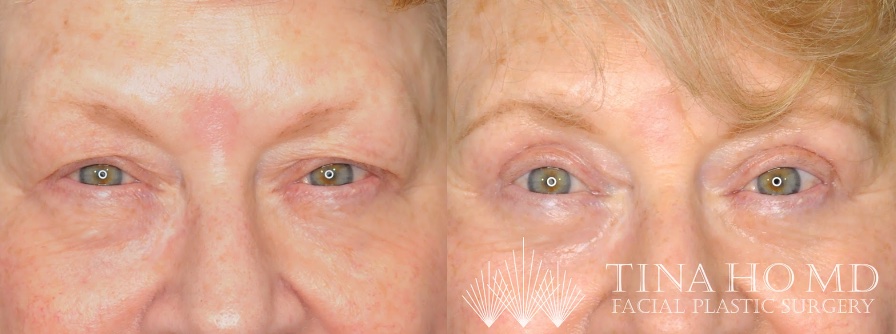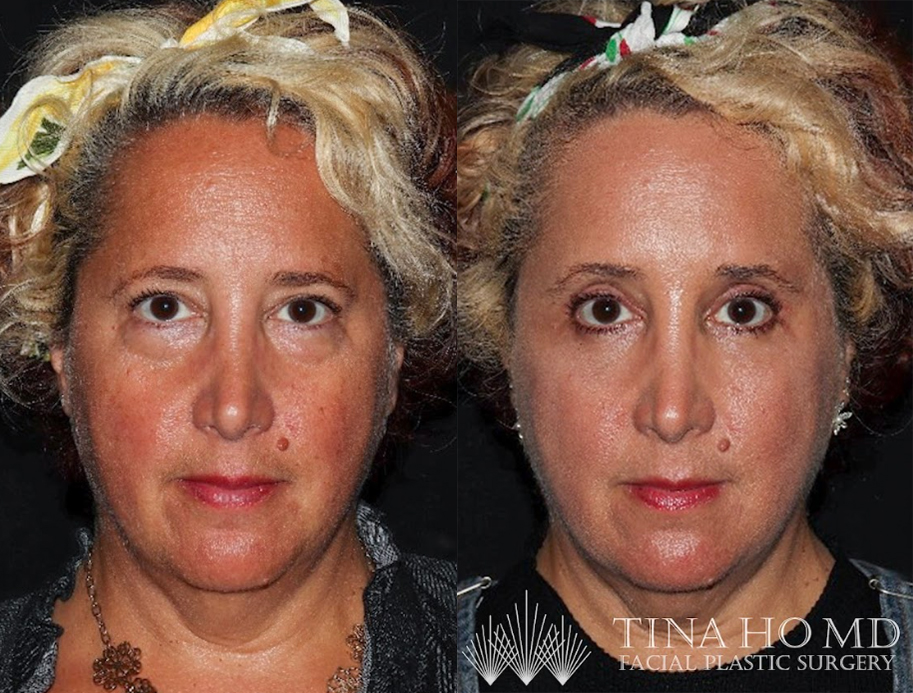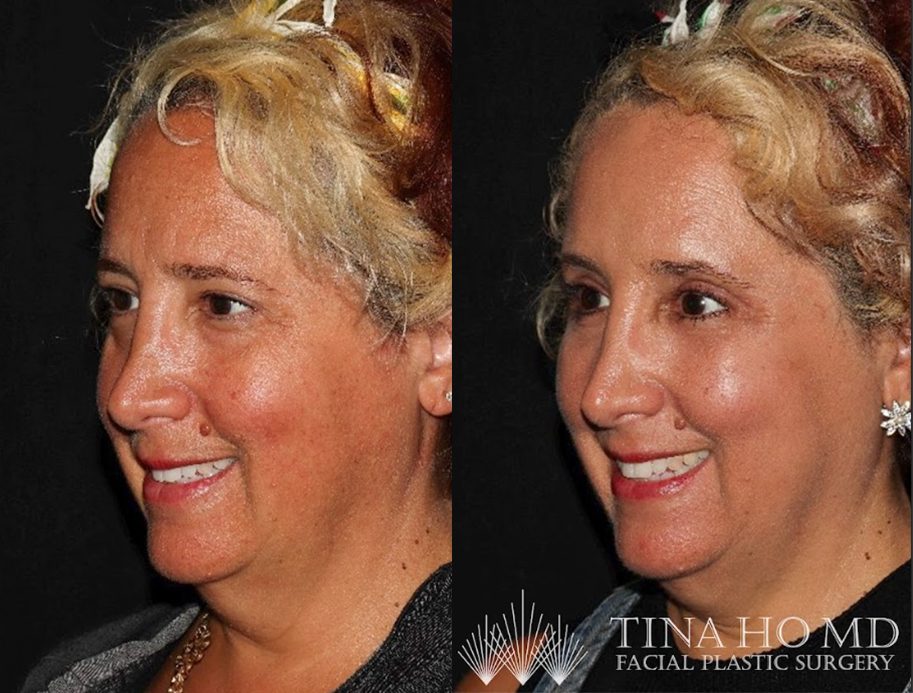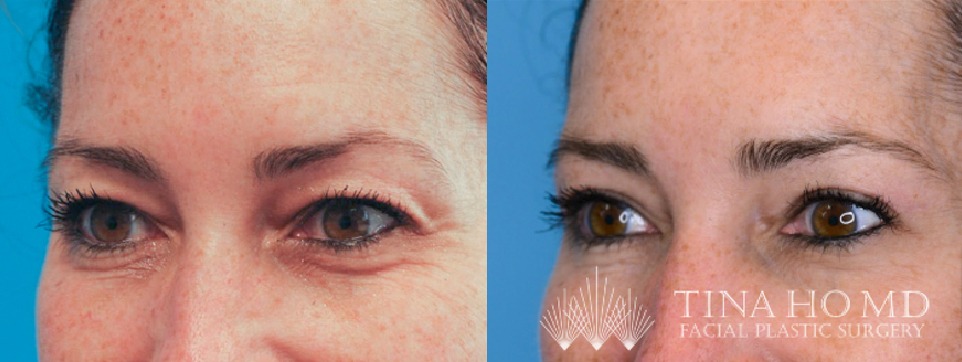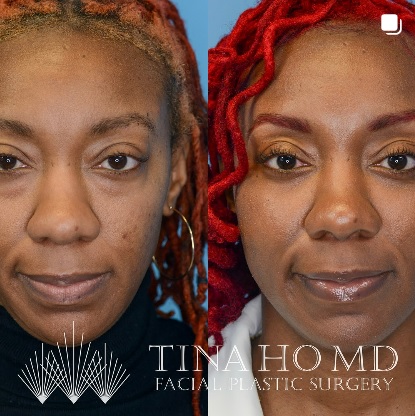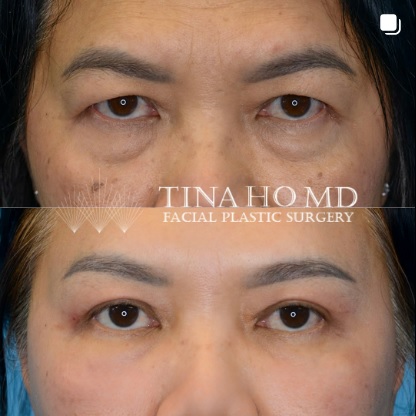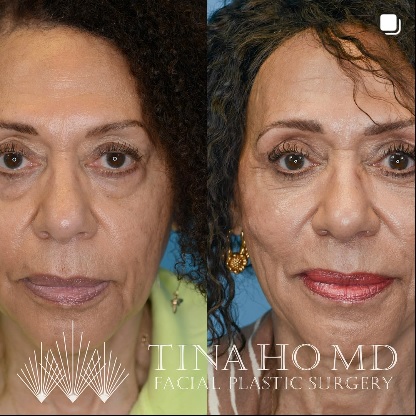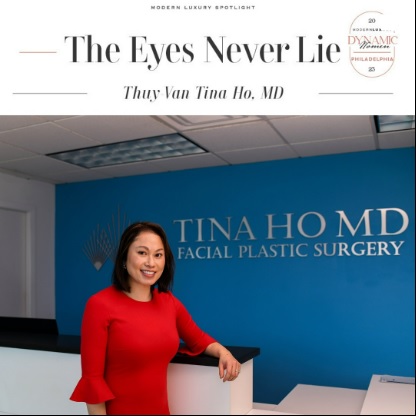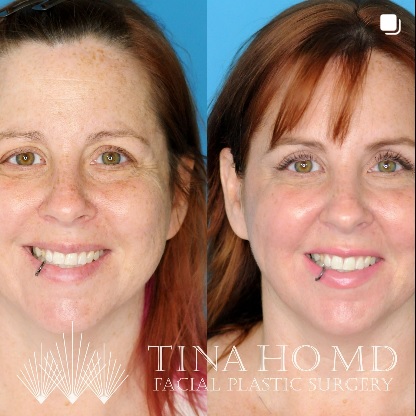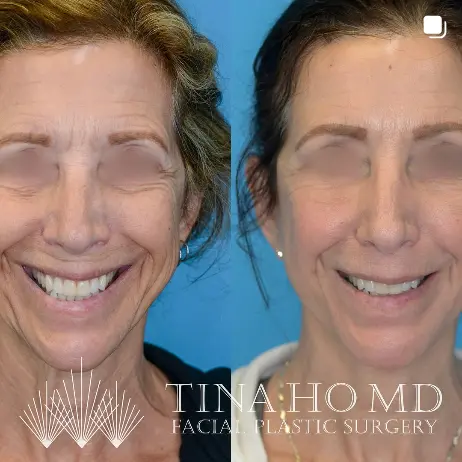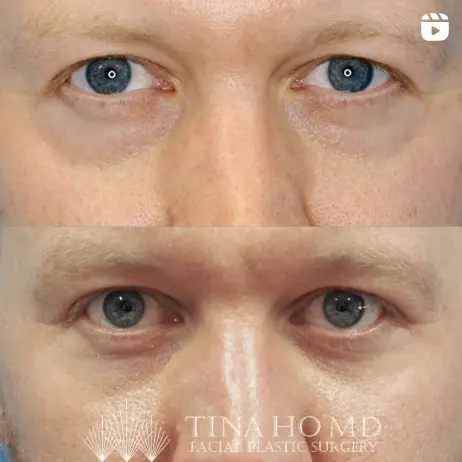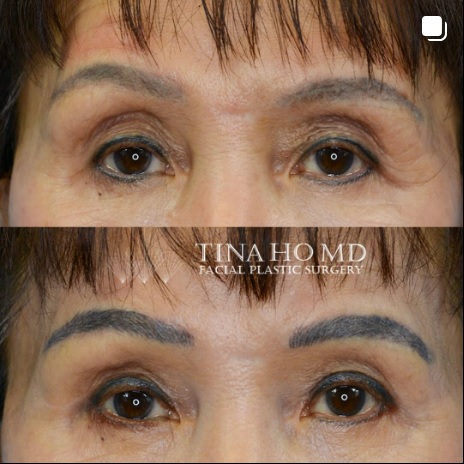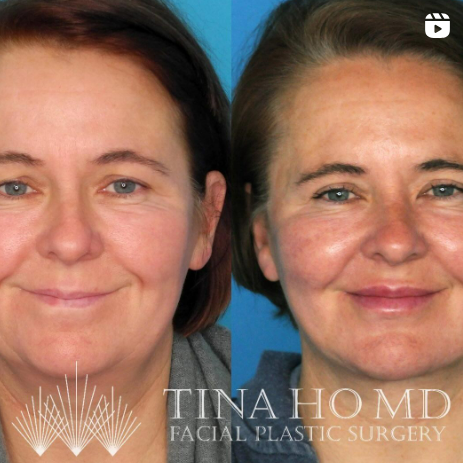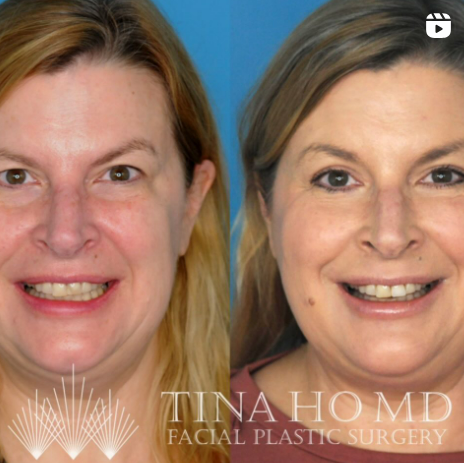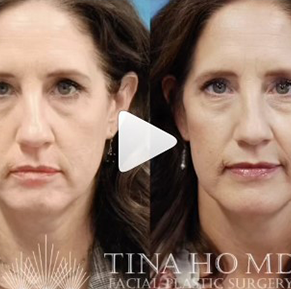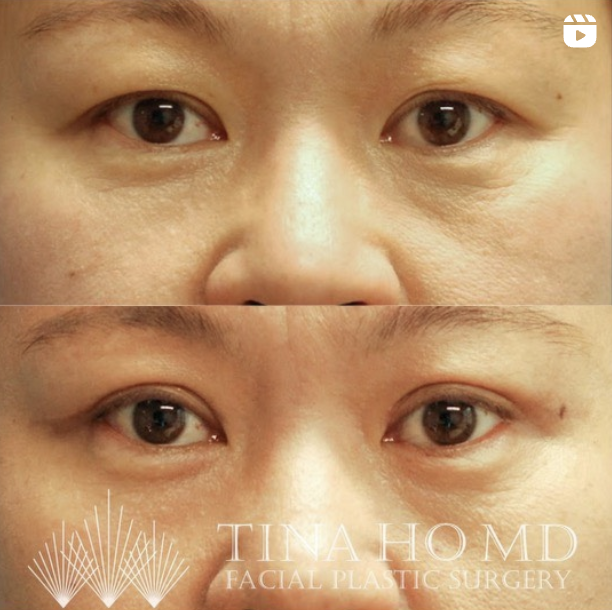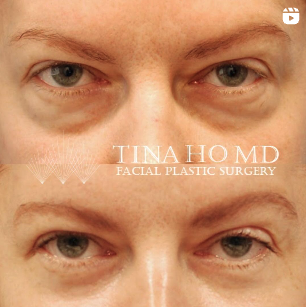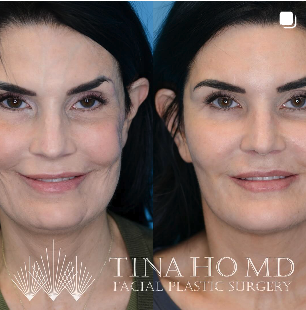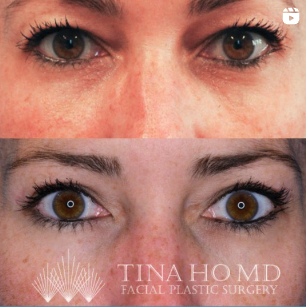Table of Contents
Book Now
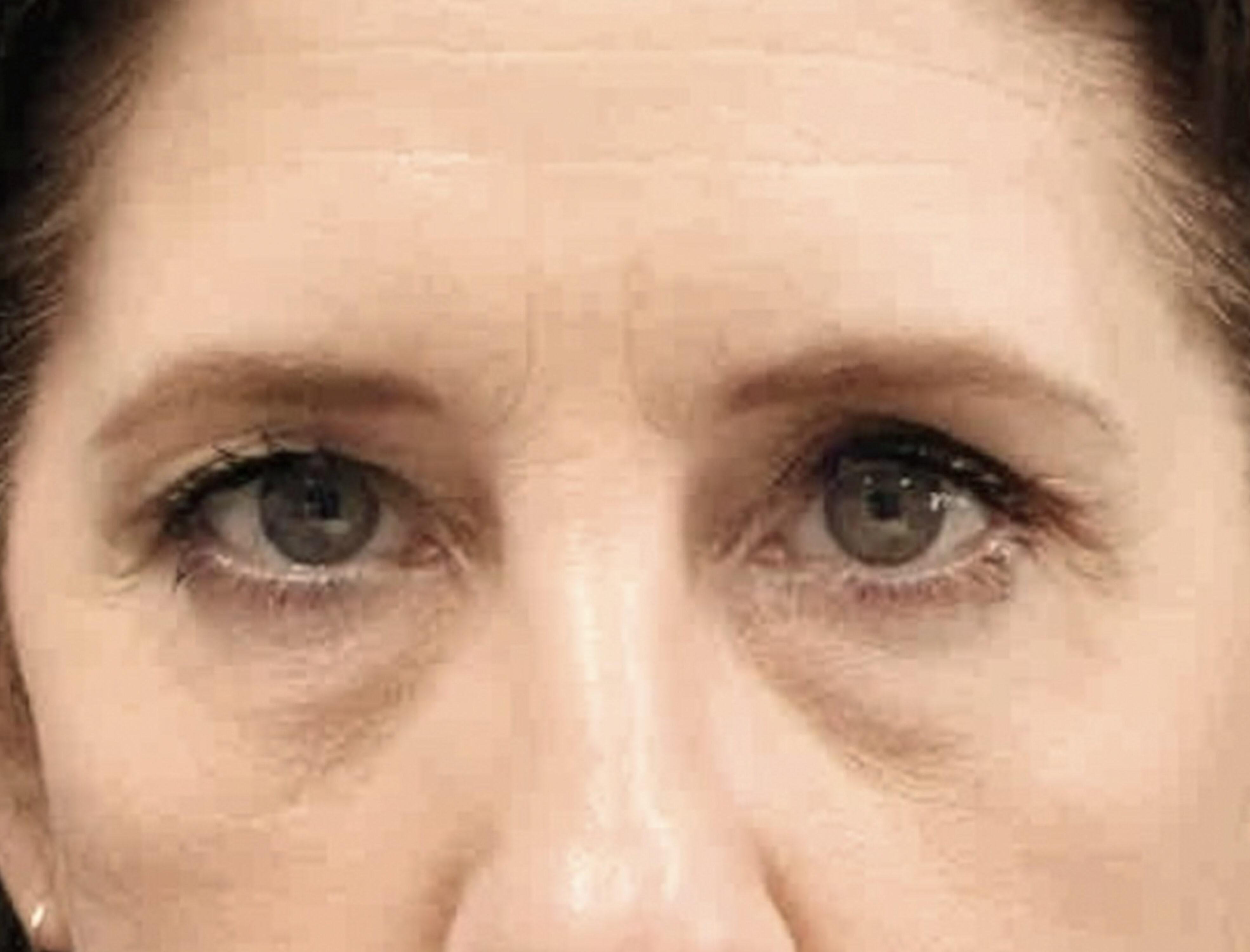
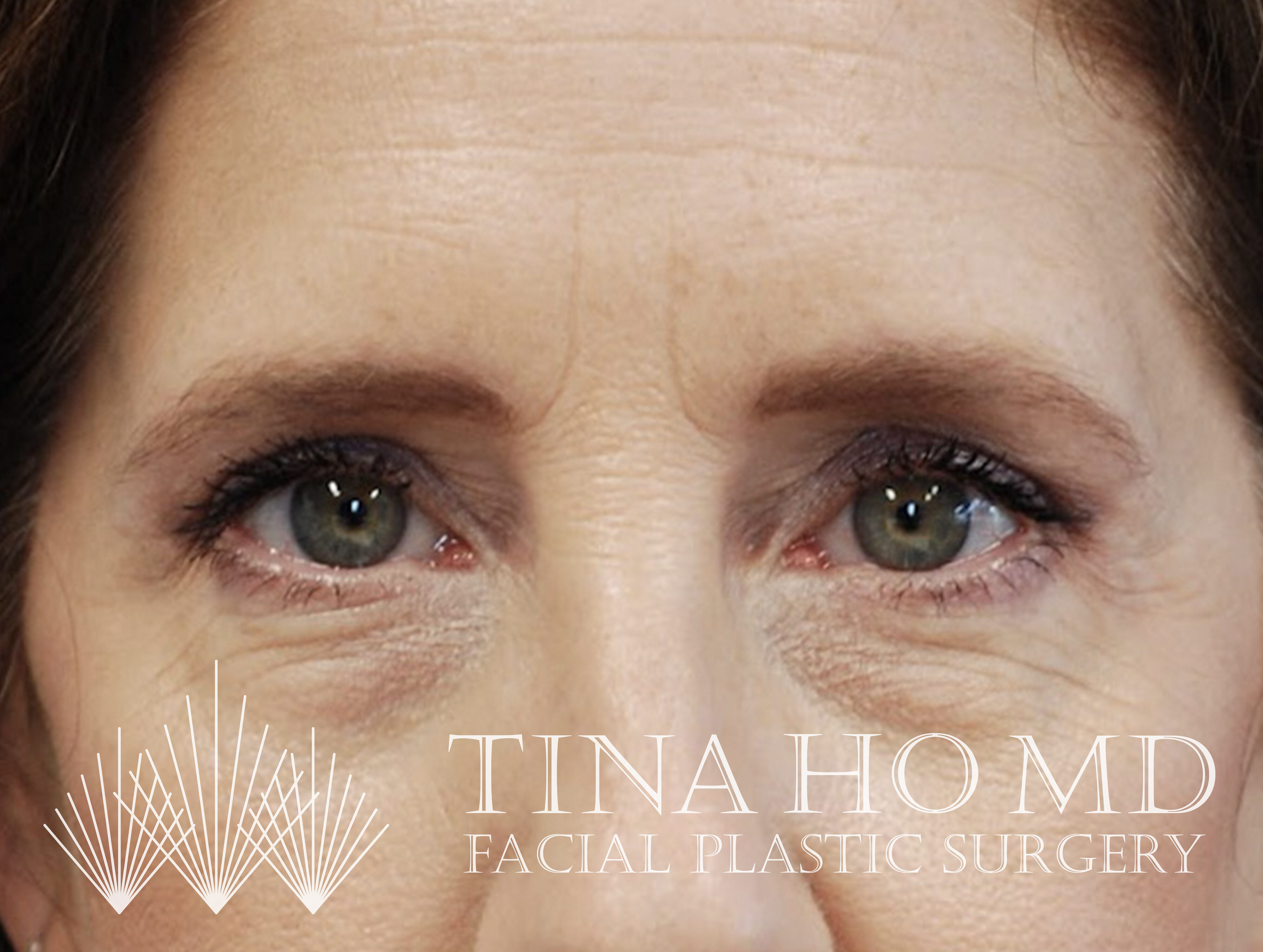
Before & After
Introduction to Blepharoplasty (Eyelid Surgery)
Educational Videos on Blepharoplasty
What is Blepharoplasty?
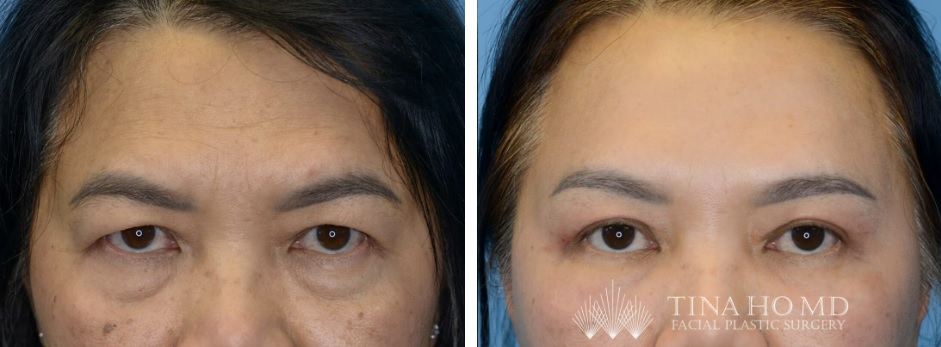
The eyes are the first features of the face to demonstrate signs of aging. Over time, the forces of gravity induce downward descent of the skin and soft tissues, resulting in dermatochalasis (excess skin in the eyelids) and a “baggy eyes” appearance.
Aging eyelids may also suffer puffiness due to fat herniation (the protrusion of orbital fat through the weakened orbital septum layer). The descent of the midface soft tissues including the cheeks may further accentuate the aging changes in the lower eyelids.
Other anatomic features that can contribute to the tired appearance of aging eyelids include brow ptosis, crow’s feet, ectropion (sagging or outward sagging of the eyelid) and under eye hollowing.
Blepharoplasty is designed to remove excess skin and fat to restore a youthful appearance to the eyes. This surgery requires the expertise of a surgeon who specializes in plastic surgery of the face and understands eyelid anatomy well.
Dr. Ho specializes in blepharoplasty and performs each eyelid surgery according to the anatomic issues and surgical goals of the individual patient.
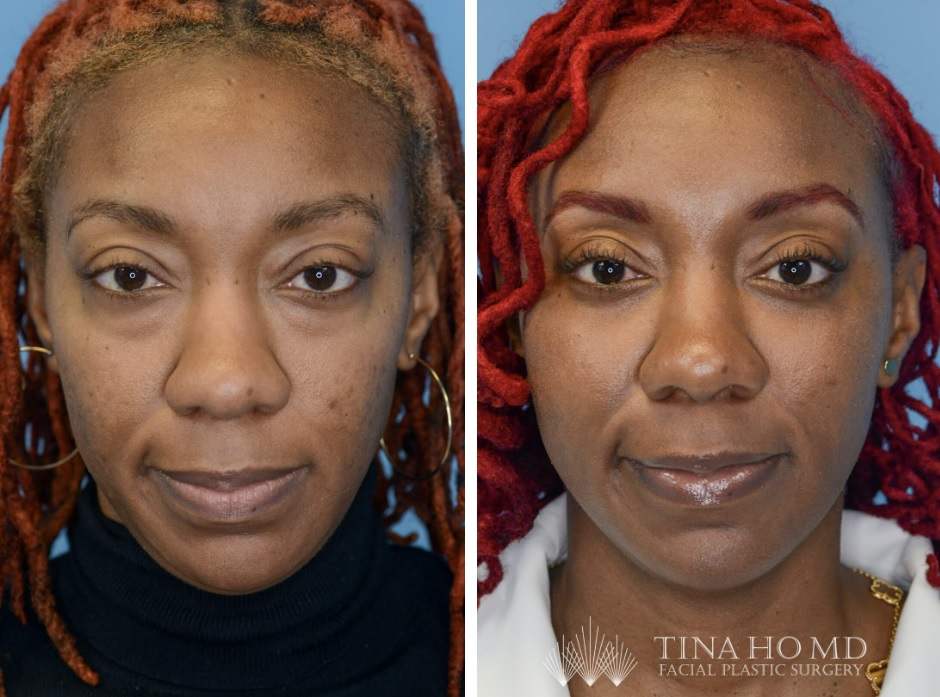
DR. HO’S LATEST MEDIA FEATURES
Dr. Ho’s Approach to Blepharoplasty
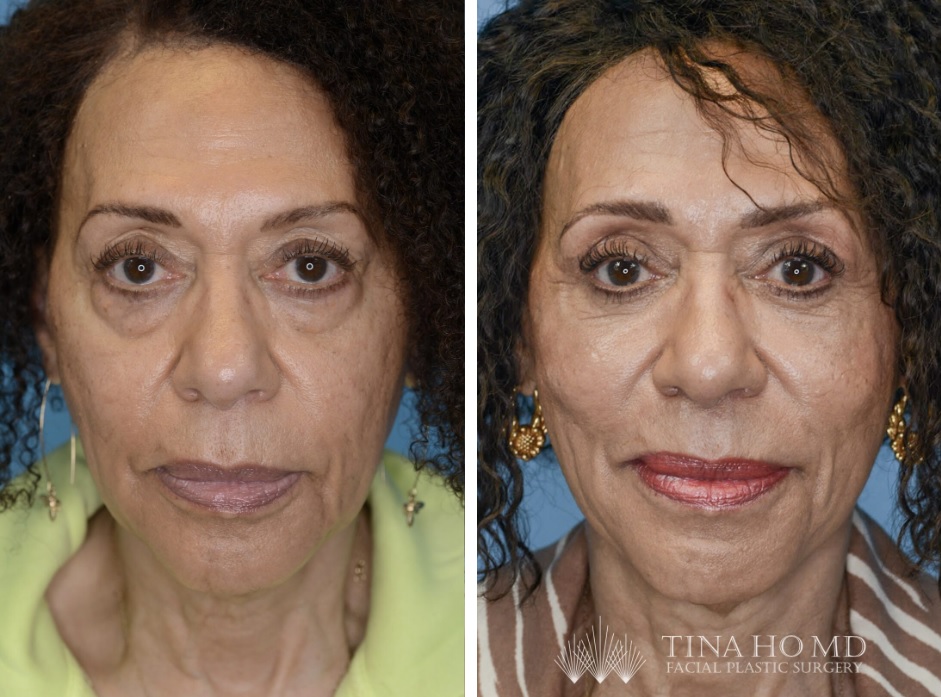
She possesses well-rounded training in a variety of blepharoplasty techniques from one of the top facial plastic surgery fellowship programs in the country. Dr. Ho operates on eyelid surgery patients hailing from Philadelphia and Wayne and from all over Pennsylvania, New Jersey, and New York.
Dr. Ho dedicates the needed time and effort with every patient to determine the best surgical plan that meets their goals and expectations.
Dr. Ho pursues a conservative approach to blepharoplasty and avoids removing excessive skin or fat that may put a patient at risk of overcorrection with a hollowed-out result. Her surgical technique focuses on creating a natural, more youthful-appearing result that is tailored to the individual patient’s anatomy.
Dr. Ho performs meticulous closure of the eyelid incisions for minimal scarring and can design her approach to lower blepharoplasty such that an external lower eyelid scar is avoided all together.
Furthermore, Dr. Ho often performs fat transfer and/or laser skin resurfacing in conjunction with lower eyelid surgery to restore volume to the under eye and cheek regions and improve eyelid skin tone and texture to further enhance a patient’s rejuvenated appearance.
Her goal is to create a more youthful and more awake, unoperated look for every blepharoplasty patient.
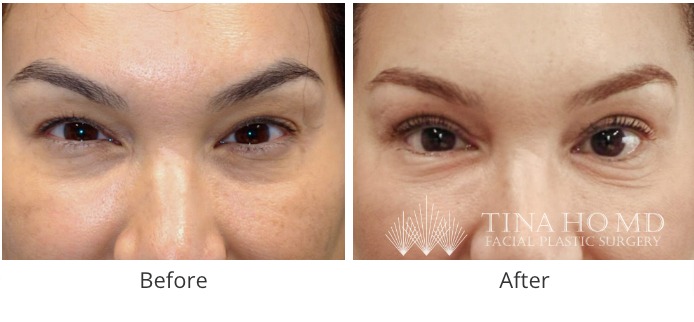
Patient Testimonials Blepharoplasty (Eyelid Lift Surgery)
What are the Ideal Eyelids?

Dr. Ho believes that while every face is unique, the ideal eyelids carry a more awake, refreshed appearance and harmonious with the rest of the face. The ideal eye aperture is 10 to 12 mm vertically from upper eyelid to lower eyelid and about 30 mm, or length of the distance between the eyelids, in width.
The ideal lower eyelid rests 1 mm above the inferior border of the iris of the eye, whereas the ideal upper eyelid spans a vertical distance of 8 to 10 mm from the upper eyelid crease to its inferior edge, which rests at the superior border of the iris.
Eyebrow position is an additional important consideration in eyelid assessment. The ideal eyebrow rests just above the supraorbital rim (upper bony of the eye socket) and arches at the level of the lateral border of the iris in females and rests at the supraorbital rim with less arching in males.
The medial end of each eyebrow should line up vertically with the lateral aspect of the nostril on the same side, whereas the lateral end should approach an oblique line that passes tangentially from the nostril to the lateral corner of the eye on the same side.
Dr. Ho uses several of these anatomic principles as a foundation for her surgical technique as well as her aesthetic intuition in eyelid rejuvenation.
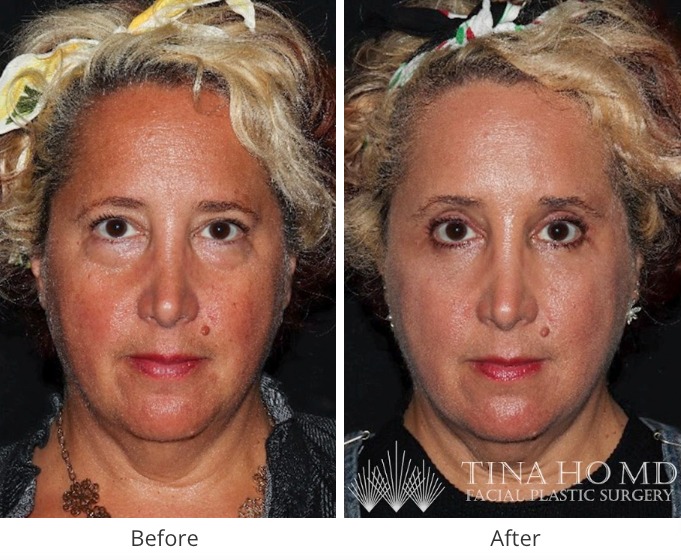
What is Double Convexity or Double Bubble Deformity?
The additional process of fat herniation (protrusion of orbital fat through a weakened septum layer) creates a second convexity in the lower eyelid. The double convexity deformity may be minimized with non-surgical treatment options such as filler injection or may ultimately require surgery for definitive improvement. Dr. Ho is experienced in the management of the aging eyes and midface and will discuss with each patient the best treatment options to address their aesthetic concerns and goals.
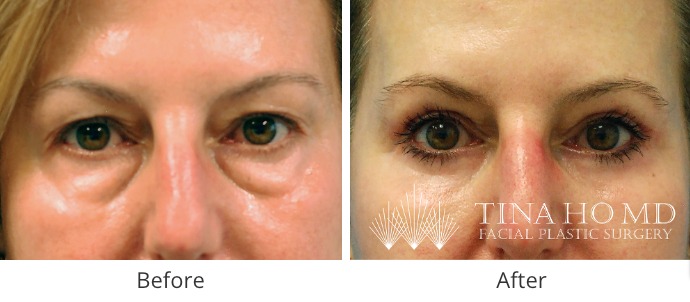
Behind the Scenes of Eyelid Surgery
What is Tear Trough Deformity?
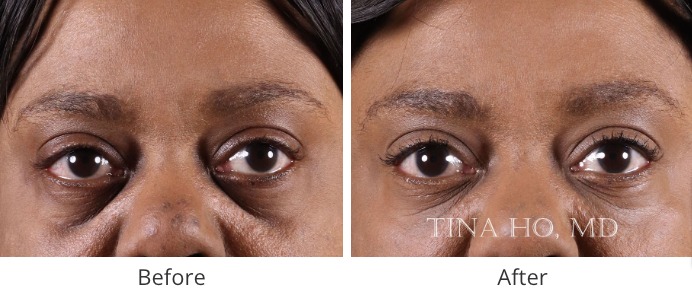
Tear trough deformity refers to a concavity or hollowed-out appearance in the lower eyelid region. Patients with tear trough deformity may present with concerns of dark circles or tired look in their lower eyelids.
Several anatomic factors associated with this issue include descent of the cheek soft tissue, loss of facial volume, underdevelopment of the lower eyelid-cheek complex, and a defect in the orbital muscle.
With aging, the combination of soft tissue atrophy and orbital fat herniation may accentuate the tear trough deformity. This condition may present in both younger and older patients and can be treated with a variety of non-surgical and surgical treatment options.
Eyelid surgery may be used to treat some of these issues. Dr. Ho is experienced in the management of tear trough deformity and dedicates ample time and effort with every patient to determine the best non-surgical or surgical plan that meets their goals and expectations.
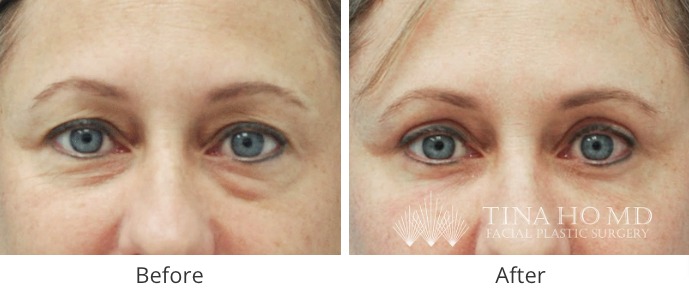
BEFORE & AFTER PHOTOS
Upper Eyelid Lift
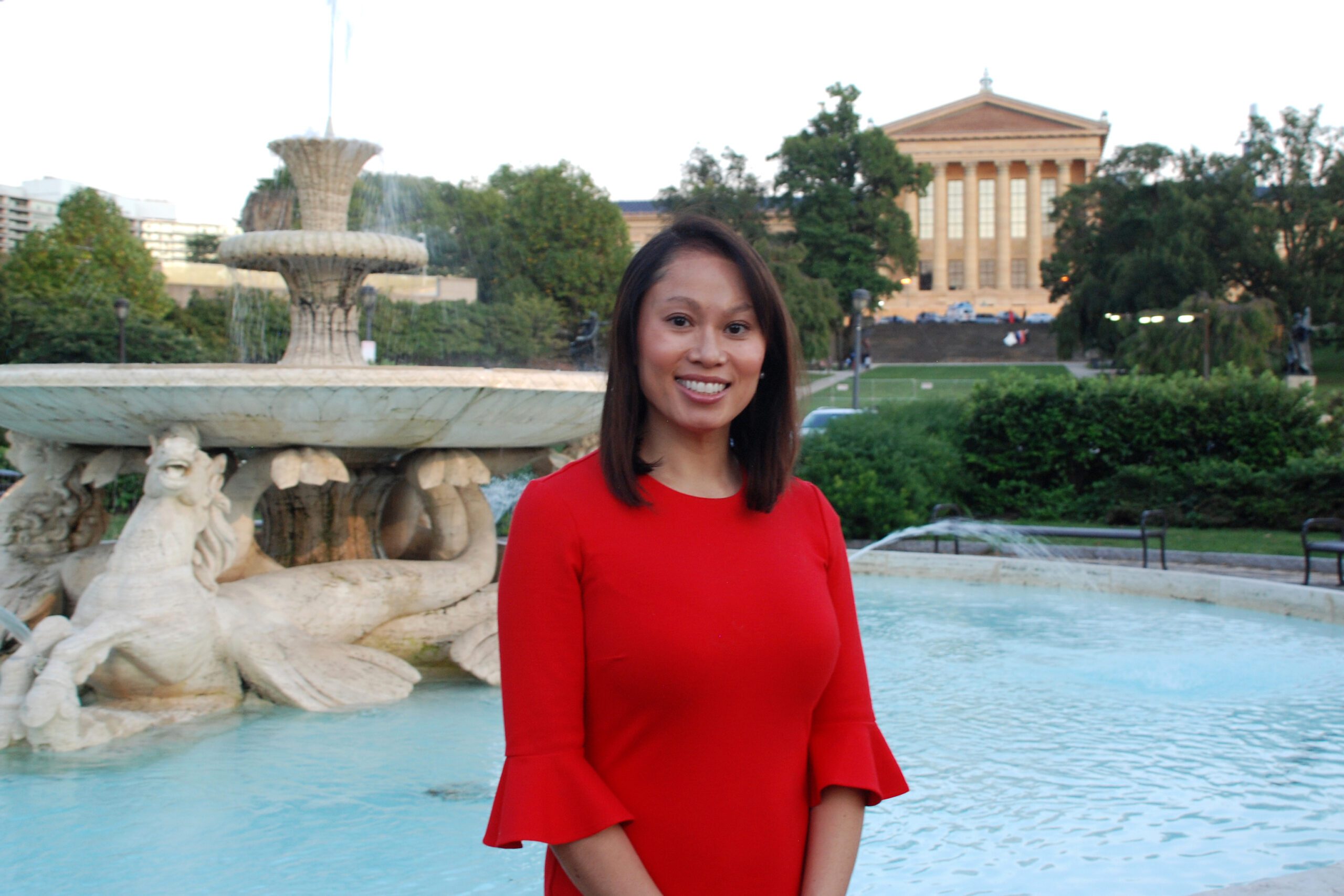
When upper eyelid surgery is performed to tighten the drooping skin that obscures a patient’s vision, it is considered a functional procedure and may be covered by medical insurance. When upper blepharoplasty is executed specifically to create a younger appearance for the eyes, it is considered a cosmetic procedure.
This procedure can be performed on one or both sets of upper eyelids (unilateral or bilateral). It may be pursued under local anesthesia in the office setting or under sedation or general anesthesia at a surgery center.
When the lower eyelids are also being rejuvenated at the same time, the upper eyelid lift is performed first. The incision for an upper eyelid lift is very fine and heals well and is made in the natural crease at the top of the eyelid. Through this incision, excess tissue is removed.
Before and After Blepharoplasty (Eyelid Lift Surgery)
Dr. Ho’s Approach to Upper Eyelid Surgery
The incisions are typically marked within the natural eyelid creases in an elliptical fashion to capture the needed excess skin to be removed. In female patients, the incisions are extended laterally by the lateral brows.
Dr. Ho pursues a conservative approach to upper eyelid lift and often does not remove underlying muscle or fat to avoid an overdone or hollow-appearing result. She also takes into consideration the fat pad volume in the upper eyelids, as some patients with volume loss may require additional fat transfer rather than fat removal for additional rejuvenation.
Dr. Ho performs meticulous suture closure of the skin to ensure the incisions heal well and become minimal scars. The sutures are typically removed at 5-7 days out from surgery.
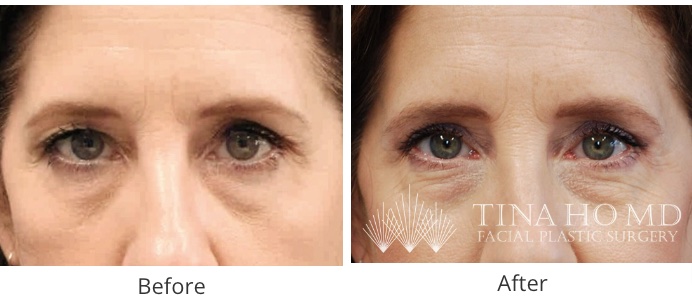
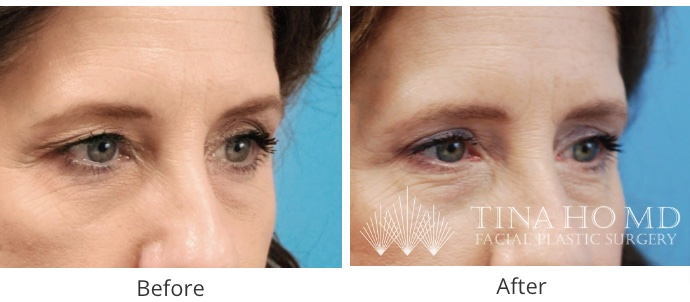
Lower Eyelid Lift
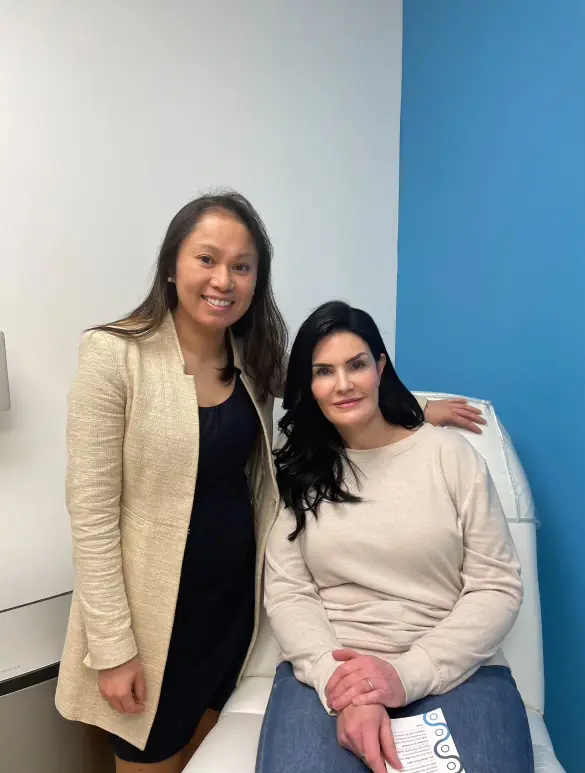
This procedure involves removing and/or repositioning excess lower-eyelid fat and tightening drooping lower eyelid skin. Adjusting the fatty tissue in the lower eyelids resolves the puffy appearance.
When it comes to associated incisions with the procedure, there are two main approaches to lower eyelid surgery. The right option for you will be decided during your consultation.
The transcutaneous, or subciliary, approach is recognized as the traditional method and involves an incision made right below the lower lash line. With this approach, redundant skin is pinched and then excised. This option is ideal for removal of excess skin and fat. The external scar is typically minimal.
The transconjunctival approach incorporates an incision on the inside of the lower eyelid so there is no apparent scar. It is best for situations where only excess fat must be addressed and does not involve removal of skin.
Once all adjustments have been made, fine sutures are used to close the incisions, completing the lower blepharoplasty procedure.
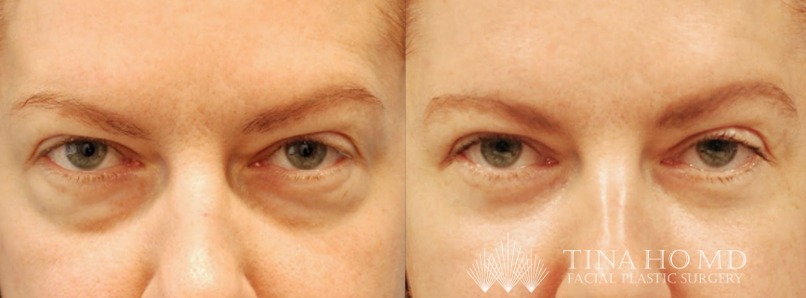


Procedures Commonly Paired with Blepharoplasty
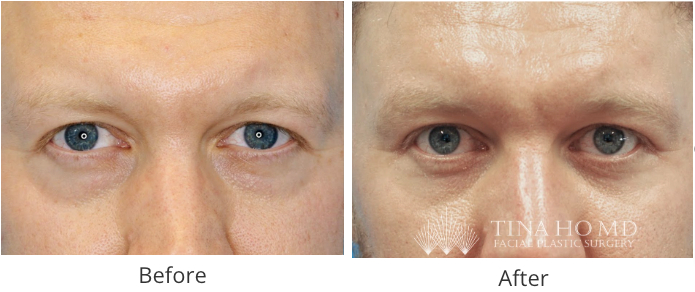
Eyebrow Lift
The title may be self-explanatory, but a brow lift focuses on raising the position of your eyebrows, which in turn make the upper eyelids appear less heavy. This is helpful for individuals who are dealing with sagging features and can deliver a much younger look after the fact. It also helps to offer more symmetry to the face, as well as smoothen forehead lines and wrinkles.
Facelift Surgery
If you’re looking for a more global rejuvenation result, facelift surgery is a great surgical option to combine with eyelid surgery. Not only will it complement the work done from your blepharoplasty, but it will provide a more youthful look from every angle.
This procedure can also help reduce sagging skin, smoothen wrinkles and folds, and make improvements along the cheeks and jawline. It is a common procedure that will only enhance the results of your eyelid surgery.
Laser Skin Resurfacing
Blemishes and scars as well as wrinkle lines may clash with the youthful look of your cosmetic procedures and can be eliminated or minimized with laser skin resurfacing.
This procedure is a nice final touch if you are looking to enhance the clarity and vibrance of your skin. At the same time, the benefits of this procedure will only heighten the quality of your blepharoplasty surgery.
These may be some of the most common procedures patients pair together with blepharoplasty, but they are not your only options by any means. It can also be challenging to determine exactly which procedures you need based on the results you are looking for. After a thorough consultation with Dr. Tina Ho, she will be able to suggest the procedures that will work best for your needs.
Other procedures you can pair with blepharoplasty include
- Rhinoplasty
- Botox injections
- Chemical peels
- Dermal fillers
It is also important to keep in mind that your surgeon Dr. Ho may advise against combining certain procedures. She will want you to take the least path of resistance to recovery while minimizing any potential toll on your health. Above all else, your health is the most important, and Dr. Ho will review whether you are an eligible candidate for each procedure you are asking for.
Eye rejuvenation surgery can offer a significant improvement in the appearance of your eyes, but it will not address other areas of the face. If you would like a more global facial rejuvenation result, you may want to look into a variety of other cosmetic procedures.
Dr. Ho’s Approach To Lower Eyelid Surgery
She most commonly creates incisions on the inner side of the lower eyelids via a transconjunctival approach that avoids external scars and distorts the lower eyelids. Through these incisions, she first removes protruding fat that causes the puffy eyelid appearance from each of the three fat pads in each eyelid.
Dr. Ho next restores the volume in the lower eyelids through facial fat transfer. She harvests fat through liposuction of the abdomen or thigh and then injects fat to the tear trough areas as well as rest of the midface including the cheeks to restore facial volume. Dr. Ho has a thorough understanding that with lower eyelid surgery, the rest of the midface also shows signs of aging and needs to be globally addressed as well to achieve the best and most youthful results.
Finally, Dr. Ho performs CO2 laser resurfacing of the lower eyelids and rest of the face to tighten the skin and optimize eyelid rejuvenation without removing eyelid skin.
Double Eyelid Lift
A patient who lacks upper eyelid folds may be an ideal candidate for this procedure. For a double eyelid lift, excess skin and fat may be removed during this procedure for additional rejuvenation.
This surgery requires the expertise of a surgeon who specializes in facial plastic surgery and understands Asian eyelid anatomy well. Dr. Ho’s expertise in blepharoplasty, with a focus on double eyelid surgery, is what makes her among the best options Philadelphia residents can rely on. Click here to learn more about Asian blepharoplasty.


Dr. Ho’s Approach to Asian Blepharoplasty
She creates fine horizontal incision lines in the upper eyelids that usually heal well and become faint scars. She removes minimal eyelid skin unless the patient has excess skin due to aging. Dr. Ho then performs careful dissection with the removal of a strip of muscle until she reaches the levator aponeurosis plane. Dr. Ho next places crease sutures through the skin and levator aponeurosis layers to create eyelid creases. These sutures are usually removed 7-10 days after surgery.
Post-Operative Instructions for Eyelid Surgery
These post-operative care instructions are essential for all eyelid surgery procedures to ensure the best possible results. Activities like walking should be resumed promptly to prevent blood clots and aid recovery, with guidelines for minimal physical exertion and no strenuous activity for two weeks. Maintaining a 30-degree head elevation during the first week helps reduce swelling. Applying cool compresses for the first 48 hours after surgery is advised to alleviate swelling, bruising, and discomfort.
Diet-wise, resuming drinking and eating is crucial, starting with gentle, bland foods. Bathing instructions involve showering the day after surgery and washing your face gently. Incision care includes cleaning incision lines and applying prescribed ointments. Medications, including antibiotics and pain relief, should be taken as directed. Tylenol is recommended for mild pain, while NSAIDs should be avoided for two weeks. Constipation is a potential side effect, so stool softeners can be added to your regimen.
Instructions also cover wearing glasses and contact lenses, avoiding certain makeup and activities for two weeks, and clothing choices for the first two weeks. Driving is discouraged while taking narcotic pain medication, and returning to work or social activities depends on your specific situation.
For out-of-town patients, staying in town for 7-10 days is advised. Follow-up appointments are crucial, with the first occurring 5-7 days after surgery.
The post-operative period may involve swelling, bruising, pain, impaired vision, bleeding, discharge, dry eye, and temperature changes. Weakness is common but should improve with time, while tightness due to swelling will subside in two weeks. Scars will gradually fade, but sunscreen is essential for the first 6-12 months. Accidental injuries are typically not concerning unless severe.
Symptoms such as fever, increased pain, signs of infection, nausea, vomiting, drainage, vision issues, difficulty breathing, or chest pain should prompt immediate contact with Dr. Ho’s office for further evaluation and guidance.
Testimonials
Blepharoplasty (Eyelid Lift Surgery) Testimonoal Videos
Book Now
– Dr. Tina Ho

FAQ’s
What should patients expect after Blepharoplasty?
Every blepharoplasty patient will follow up with Dr. Ho one week after surgery for suture removal. Each patient will then follow-up again at weeks to months out at regular intervals for re-evaluation.
The downtime for blepharoplasty is usually minimal; most patients can return to normal daily activities, apart from heavy lifting, straining, and strenuous activity, the day after surgery.
Patients should expect immediate bruising and swelling after surgery that can be managed well with icing and head elevation and typically resolve by two weeks out from surgery.
Patients who undergo additional fat transfer may experience more lingering swelling that may take up to one month to resolve. Post-operative pain is usually mild and managed well with prescribed pain medication.
Improvement in the appearance of the eyelids is typically observed immediately or after most of the bruising and swelling has subsided. Eyelid skin heals quickly, and blepharoplasty incisions usually heal well with minimal scarring.
Dr. Ho seeks regular follow-up with her patients to ensure that every patient heals well and is satisfied with their surgical outcome.
What are other surgical procedures that are routinely performed with Blepharoplasty?

It is common for other procedures to be performed at the same time as blepharoplasty surgery, depending on the patient’s anatomic issues and surgical goals. They include but are not limited to the following: facelift, neck lift, browlift, fat transfer, and laser skin resurfacing.
Dr. Ho is experienced in a wide range of aging face procedures and will thoroughly evaluate each blepharoplasty candidate and discuss with them whether they would benefit from additional procedures at the time of their surgery.
How much does a Blepharoplasty cost in Philadelphia?
The cost of a blepharoplasty, which covers both upper and lower eyelid surgery, can vary based on several factors including the surgical techniques used, the type of anesthesia, and the time needed for the procedure. If the surgery is performed for functional reasons, some insurance providers may cover a part of the cost.
The average price range for an upper blepharoplasty is around $6,000 to $8,000. This includes procedures such as droopy eyelids.
For lower eyelid surgery, the range is $10,000 to $14,000, which includes procedures such as under-eye bag removal.
Asian Blepharoplasty (Double Eyelid Surgery) average $7,000-$9,000 including facility and anesthesia fees
Financing options may be available. It is important to keep in mind that different surgeons may have different pricing strategies, some offering an all-inclusive fee while others itemize each expense. Dr. Ho’s price ranges try to consider all fees to avoid surprises. More precise pricing information is provided during your initial consultation.
What type of doctor is best for eyelid surgery
Your surgeon should also be able to provide before and after photos in addition to answers to any of your questions. A blepharoplasty may be a relatively quick procedure, but considering the sensitive nature of the human eye, you do not want to take any unnecessary risks.
How do I know if I need eyelid surgery?
In rare circumstances, this sagging skin can also affect your eyesight. However, most people are simply looking for a boost in their appearance that looks more youthful. Sagging skin is only one factor here, as many individuals deal with very puffy bags under the eyes as well.
You may only need to make adjustments to one of the eyelids, but for a more symmetrical look, many people get work done on both. As with any cosmetic surgery, the requirements of the procedure will differ for each patient. To know what is best for you, do not hesitate to discuss your concerns with your surgeon.
Can you reverse eye bags?
You will benefit from a substantial boost in your appearance, and the eye bags will not be nearly as prominent or even visible at all in some cases. During your procedure, Dr. Ho will remove any excess fat under your eye, which will reduce the visible puffiness in the local area.
Depending on the severity of your eye bags, your results may be minor or more significant, yet will be be noticeable nonetheless. This particular procedure is most effective for those who are starting to show signs of natural aging.
What causes eyelid bags?
In other cases, it is possible for fluid to collect below the eyes. Symptoms associated with eye bags include saggy or loose skin, swelling, and dark circles. Some of these features begin to show as early as in our 30s or not until in our 50s for others.
Many people find eye bags quite unsightly, but with minimal downtime, blepharoplasty can reduce the prominence of eye bags. For most people, it is simply a task of removing fat content under the lower eyelid, and they will look good as new. It only requires a small incision, and the healing process is well tolerated.
How long do eyelid lifts last?
Always remember that natural aging will continue to take place and may work against the results of blepharoplasty over time. Some people may notice minor changes, while others may want to look into touch-up work down the road. Overall, the results last for several years and make the initial investment entirely worth it for most patients.
What is a good age for blepharoplasty?
The best way to find out when it is the right time is to consult a surgeon on the matter. They will be able to evaluate your anatomy and make suggestions that will help you achieve the appearance you want.
Contact Us
Dr. Ho is a highly skilled, fellowship-trained double board-certified facial plastic surgeon who will help guide you through the entire process of blepharoplasty in Philadelphia. She will be happy to address any questions and concerns you have along the way.
Your Blepharoplasty (Eyelid Surgery) will be performed by Dr. Tina Ho at an office or surgery center setting in Philadelphia or the Main Line.
Book Now

